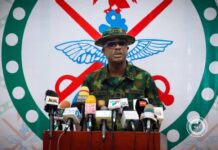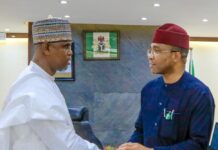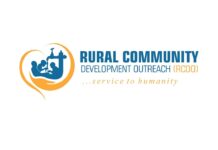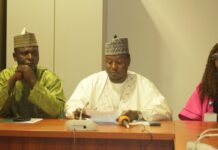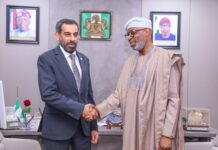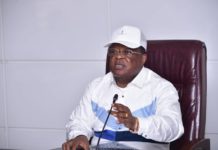In line with the digital literacy campaign of the National Information Technology Development Agency (NITDA), the Director General NITDA Kashifu Inuwa CCIE has said the Agency’s committed to achieving 70% digital literacy level by 2025 through innovative approaches in delivering initiatives, continuous collaborations and stakeholder engagement.
Inuwa made this known while receiving representatives from the Afre.lib Academy led by the Executive Director of Operation Mrs Joice Gomina who were on a visit to the Agency’s Corporate Headquarters in Abuja.
The purpose of the visit was to seek NITDA’s partnership as co-host of Afre.lib Academy’s bootcamps in August; 2024 Tech and Career Expo with the theme “Tech for Earth” in September; to have the DG as a Keynote Speaker and sponsorship support for their Tech Challenge Winners.
He said from the digital literacy perspective “We have three key areas, firstly, is the Formal Education where we are working with the minister of education to review curriculum and infuse all these skills in formal education, but we have a lot to do to achieve that in terms of training the teachers, getting the equipment available for them to use and so on.”
“Sencodly, for those outside the formal education (informal), we have an initiative which we call the Digital Literacy for All where we are working on building an Edtech platform (a learning Management System) where people can learn at their own pace. We are looking at translating it to Nigerian Languages, so that people who cannot read and understand English can do so in their own local languages.”
“We are exploring partnering with the National Youth Service Corp (NYSC) as they are in 774 local government areas, to be onboarding people and making the content as simple as possible. So that anybody who listens or watches these contents can pick something from it. We believe going through the NYSC will help use reach the critical mass we are looking at.”
“Finally, we also have the formal workforce, which is to train people working for the government and private sector because the workforce needs to be digitally literate to increase productivity at work.
Inuwa assured the Academy of the Agency’s full support as both organisation share the same vison of fostering IT development and digital literacy.
“We need to review your curriculum to make sure it aligns with the National Digital Literacy Framework (NDLF).”
He added that NITDA is working to have at least one Innovation Hub per state so that when people learn they can have a place to develop there proof of concept
He stated that both organisations can work together in the aspect of having tech clubs across schools in the country.
The ED Afre.lib Mrs Gomina said that the Academy’s which is a made up of a team of experts’ passionate educators has seen the gap between young children who are digital natives and their teachers who are still using old methods to prepare them for a future that is constantly evolving.
She said the Academy is working on building a platform where these children will be mentored and given a safe space to explore technology within the ethics of morality.
“We want to reduce that entitlement mentality and increase that mentality of citizenship, responsibility, and showing them that they can contribute to nation building using technology,” she said
She mentioned that some of the activities of the Academy includes, bootcamps for children, summer tech challenges teacher training as she appreciated the Agency for its willingness to support and partner with the Academy.
The Academy did a demo of some of the prototype developed by children who have undergone trainings with them.
END










